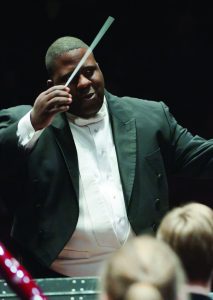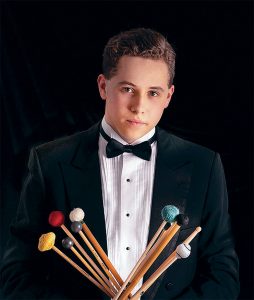FSPA Concerto Competition Provides Lessons Beyond the Music

Performing as a soloist in front of an orchestra is the classical music equivalent of being a rock star. The Flint School of Performing Arts (FSPA) Concerto Competition is an opportunity for advanced music students (grades 9-12) to compete for the chance to (classically) rock out with the accompaniment of the Flint Youth Symphony Orchestra (FYSO). But it’s also an invaluable experience that participants will carry with them for the rest of their lives.
Winning the concerto competition looks great on the resume of a serious high school musician aspiring towards a professional career, explained Davin Pierson Torre, FSPA’s director and vice president of performing arts instruction.
“But it’s so much more than that. The experience of performing a concerto on-stage, in front of a full symphony orchestra, is priceless,” said Torre.

Karl Rueterbusch, who won the competition in 2018, cited the culminating performance as a highlight of the overall experience.
“It was a truly amazing experience to perform Toshiro Mayuzumi’s Xylophone Concerto, and the orchestra did a fantastic job. After having spent so much time practicing and rehearsing the concerto, it was a special moment to finally share it with an audience,” Rueterbusch said.
Torre also emphasized the importance of the preparation process, a sentiment echoed by competition winner Jamal Duncan (1993).
“I think an opportunity like this shows you so much about yourself. How much are you willing to dig in and expect the best that you can offer?” said Duncan, associate director of bands and assistant director of undergraduate studies in music at Arizona State University.
“As musicians, we tend to highlight the act of the ‘the performance,’ but for me, especially today, the learning is in the journey, the performance is just the outgrowth of the preparation,” Duncan explained.
Both Rueterbusch and Duncan have gone on to pursue music beyond their time at FSPA but cite arts education as formative regardless of one’s career path.
“The arts enrich the lives of everyone who participates in them,” said Rueterbusch. “Learning an instrument requires practice, dedication, a developed work ethic and the ability to motivate yourself even when the process is frustrating. These skills are useful in everyday life.”
“Music is important to human existence … used culturally in moments of celebration, in moments of mourning and all moments in between,” said Duncan. “It’s a release for many and allows us to feel more deeply and interact more intentionally. The art of studying music opens the doors to success in many careers.”
So, where are they now? Karl Rueterbusch just finished his second year studying percussion performance at the University of Michigan’s school of Music, Theater and Dance. He just won the university’s concerto competition and is grateful for the opportunity to perform another concerto accompanied by one of his peer orchestras.
Jamal Duncan is a music educator at Arizona State University and conducts the wind symphony, teaches undergraduate conducting, and works with graduate conducting students. He works with the ASU Wind Symphony who are predominantly music majors studying to be music teachers, music therapists, and performers, as well as the Maroon and Gold Band, an ensemble primarily comprised of non-music majors who want to play in college. Duncan will also launch the Arizona State Youth Wind Ensemble for high school students this fall, which is directly patterned after his experiences in FSPA youth ensembles.
Win or lose, there is much to gain from auditioning for the FSPA Concerto Competition (and studying the arts). Eligible students might consider digging into the solo repertoire for their instrument and challenging themselves to achieve a personal best … and have
the chance to be a rock star alongside
FYSO.